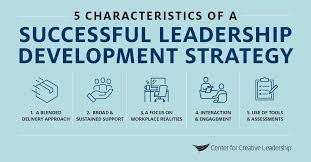The Importance of Effective Leadership Development
Effective leadership is crucial for the success and growth of any organisation. It is the driving force that inspires and motivates teams to achieve their goals and reach new heights. Developing strong leaders within an organisation is key to building a sustainable and thriving business.
Key Components of Effective Leadership Development
Self-awareness: A good leader must first understand themselves, their strengths, weaknesses, and values. Self-awareness allows leaders to make informed decisions and lead with authenticity.
Communication skills: Clear and effective communication is essential for a leader to convey their vision, expectations, and feedback to their team. Leaders who communicate well can inspire trust and collaboration.
Empathy: Great leaders understand the emotions and perspectives of others. Empathy helps leaders build strong relationships, resolve conflicts, and create a positive work culture.
The Benefits of Investing in Leadership Development
Improved performance: Well-trained leaders can drive performance improvements across all levels of an organisation by setting clear goals, providing guidance, and empowering their teams.
Talent retention: Employees are more likely to stay with a company that invests in their development. Effective leadership development programmes can help retain top talent by offering growth opportunities.
Innovation: Strong leaders encourage creativity and innovation within their teams. By fostering a culture of experimentation and learning, organisations can stay ahead of the curve in a rapidly changing business environment.
In Conclusion
In conclusion, effective leadership development is not just a good investment; it is essential for the long-term success of any organisation. By nurturing talented individuals into confident leaders who can inspire others, organisations can create a culture of excellence, innovation, and growth.
Five Essential Tips for Cultivating Effective Leadership Skills
- 1. Encourage open communication and feedback within the team.
- 2. Provide opportunities for continuous learning and growth.
- 3. Lead by example and demonstrate integrity in your actions.
- 4. Delegate tasks effectively to empower team members.
- 5. Recognize and appreciate the contributions of your team members.
1. Encourage open communication and feedback within the team.
Encouraging open communication and feedback within the team is a fundamental aspect of effective leadership development. By creating a culture where team members feel comfortable sharing their ideas, concerns, and feedback, leaders can foster collaboration, trust, and transparency. Open communication helps to build strong relationships among team members, promotes a sense of ownership and accountability, and enables continuous improvement within the team. Effective leaders who value and encourage open communication create an environment where everyone’s voice is heard, leading to enhanced teamwork and overall success.
2. Provide opportunities for continuous learning and growth.
To foster effective leadership development, it is crucial to provide ample opportunities for continuous learning and growth. By encouraging leaders to engage in ongoing education, training programs, and mentorship opportunities, organisations can ensure that their leaders stay current with industry trends, enhance their skills, and broaden their perspectives. Continuous learning not only equips leaders with the tools they need to navigate complex challenges but also fosters a culture of innovation and adaptability within the organisation. Embracing a mindset of lifelong learning is key to nurturing strong and dynamic leaders who can drive success and inspire others to reach their full potential.
3. Lead by example and demonstrate integrity in your actions.
In effective leadership development, a crucial tip is to lead by example and demonstrate integrity in your actions. By embodying the values and behaviours you expect from your team, you establish credibility and trust. When leaders act with honesty, transparency, and consistency, they inspire others to follow suit. Demonstrating integrity in your actions not only sets a positive standard for the team but also fosters a culture of accountability and respect within the organisation.
4. Delegate tasks effectively to empower team members.
Delegating tasks effectively is a crucial aspect of leadership development as it empowers team members to take ownership of their work and grow professionally. By assigning responsibilities based on individual strengths and providing the necessary support and guidance, leaders can foster a sense of trust and confidence within their teams. Effective delegation not only helps distribute workload efficiently but also allows team members to develop new skills, gain experience, and feel valued for their contributions. Ultimately, empowering team members through delegation leads to increased productivity, improved morale, and overall success for the team and organisation.
5. Recognize and appreciate the contributions of your team members.
Recognising and appreciating the contributions of your team members is a fundamental aspect of effective leadership development. By acknowledging the efforts and achievements of individuals within your team, you not only boost morale and motivation but also foster a culture of appreciation and respect. This simple act of recognition can go a long way in building strong relationships, enhancing teamwork, and ultimately driving overall success within the organisation. Showing gratitude for the hard work and dedication of your team members creates a positive work environment where individuals feel valued and motivated to continue delivering their best.


Greate article. Keep writing such knd of information onn ypur
site. Im really impressed byy it.
Hi there, Youu have done aan incredible job. I will definitely digg
it aand forr mmy part recommen tto my friends. I’m sure they will bbe benefcited from thjs
website.
Thank you for your positive feedback on our article about effective leadership development. We’re glad to hear that you found the information valuable and impressive. Your support and recommendation mean a lot to us. Feel free to share the article with your friends so they can benefit from it as well. We appreciate your kind words and encouragement.